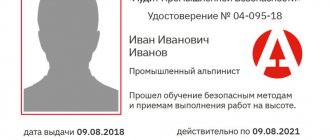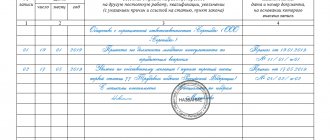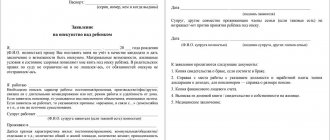Basic provisions regarding the procedure for appointing guardians and trustees
The legal status of guardians and trustees is determined by the legislation of the Russian Federation.
Regulation is mainly carried out by the Civil Code and the Federal Law “On Guardianship and Trusteeship”. The legal status of activities in the field of guardianship and trusteeship of minors is also regulated by several regulations, including the Family Code of the Russian Federation, the Letter of the Ministry of Education and Science “On the organization and implementation of activities for guardianship and trusteeship of minors” and the Federal Law “On additional guarantees for the social protection of orphans” and children left without parental care."
https://www.youtube.com/watch?v=ytcopyright
The general procedure in which guardians and trustees are appointed is as follows:
- the consent or application of the person who intends to become a guardian is required;
- if within a month a person who needs a permanent guardian has not been appointed, these functions are temporarily transferred to the guardianship authority;
- during this period, authorized persons are engaged in identifying a guardian;
- in the absence of a guardian, the person is sent to a specialized state institution.
To register guardianship, the guardianship authorities have the right to require all necessary documents from the candidate, including a certificate of completion of specialized courses. A temporary representative may also be appointed for a child or incapacitated adult. He must be of legal age, have legal capacity and have suitable living conditions.
A temporary guardian has virtually the same rights and responsibilities as a permanent guardian. The exception is his right to dispose of all the property of his ward. In practice, persons appointed as guardians temporarily may be appointed in a general manner.
Decree of the Government of the Russian Federation of May 18, 2009 No. 423
Approved by Decree of the Government of the Russian Federation of May 18, 2009 No. 423
1. These Rules establish the procedure for selecting, registering and training citizens who have expressed a desire to become guardians or trustees of minor citizens or to accept children left without parental care into a family for upbringing in other forms established by the family legislation of the Russian Federation (hereinafter referred to as citizens who have expressed a desire to become guardians), and a list of documents submitted by them for the purpose of appointing them as guardians or trustees (hereinafter referred to as guardians) of minor citizens, as well as the timing of consideration of such documents by the guardianship and trusteeship authorities.
2. Selection, registration and training of citizens who have expressed a desire to become guardians are carried out by the guardianship and trusteeship authorities.
The selection and training of citizens who have expressed a desire to become guardians can also be carried out by educational organizations, medical organizations, organizations providing social services, or other organizations, including organizations for orphans and children without parental care, exercising the specified powers of guardianship authorities and guardianship.
3. The guardianship and trusteeship body, through the official website of the guardianship and trusteeship body on the information and telecommunications network “Internet” and the media, informs citizens about the opportunity to become guardians, the procedure for establishing guardianship (trusteeship) and children left without parental care who need to be established guardianship and trusteeship (derived information), and also receives citizens who have expressed a desire to become guardians.
(Clause as amended, put into effect on February 27, 2013 by Decree of the Government of the Russian Federation dated February 14, 2013 No. 118 - see previous edition.)
4. A citizen who has expressed a desire to become a guardian submits the following documents to the guardianship and trusteeship authority at the place of residence:
a) an application requesting his appointment as a guardian (hereinafter referred to as the application);
b) a certificate from the place of work of the person who has expressed a desire to become a guardian, indicating the position and average salary for the last 12 months and (or) another document confirming the income of the specified person, or a certificate from the place of work of the spouse of the person who has expressed the desire become a guardian, indicating the position and average salary for the last 12 months and (or) another document confirming the income of the spouse;
(Subclause as amended, put into effect on July 15, 2013 by Decree of the Government of the Russian Federation dated July 2, 2013 No. 558 - see previous edition.)
c) an extract from the house (apartment) register from the place of residence or another document confirming the right to use the residential premises or the right of ownership of the residential premises, and a copy of the financial personal account from the place of residence;
d) a certificate from the internal affairs bodies confirming that the citizen who has expressed a desire to become a guardian has no criminal record or criminal prosecution for crimes provided for in paragraph 1 of Article 146 of the Family Code of the Russian Federation;
(Subclause as amended, put into effect on February 27, 2013 by Decree of the Government of the Russian Federation dated February 14, 2013 No. 118 - see previous edition.)
e) a medical report on the state of health based on the results of an examination of a citizen who has expressed a desire to become a guardian, issued in the manner established by the Ministry of Health of the Russian Federation;
(Subclause as amended, put into effect on September 18, 2012 by Decree of the Government of the Russian Federation dated September 4, 2012 No. 882 - see previous edition.)
f) a copy of the marriage certificate (if the citizen who has expressed a desire to become a guardian is married);
g) written consent of adult family members, taking into account the opinion of children over 10 years of age living together with a citizen who has expressed a desire to become a guardian, to accept a child (children) into the family;
h) the subparagraph has lost force since February 27, 2013 - Decree of the Government of the Russian Federation of February 14, 2013 No. 118 - see the previous edition;
i) a copy of a certificate or other document confirming the completion of training of a person wishing to accept into his family a child left without parental care, in the manner established by paragraph 4 of Article 127 of the Family Code of the Russian Federation (except for close relatives of children, as well as persons who are or were guardians (trustees) of children and who were not removed from fulfilling the duties assigned to them, and persons who are or were adoptive parents and in respect of whom the adoption was not cancelled). The form of the certificate is approved by the Ministry of Education and Science of the Russian Federation;
(Subclause as amended, put into effect on September 1, 2012 by Decree of the Government of the Russian Federation dated April 25, 2012 No. 391; as amended by Decree of the Government of the Russian Federation dated February 14, 2013 No. 118; as amended , put into effect on February 21, 2014 by Decree of the Government of the Russian Federation of February 10, 2014 No. 93 - see previous edition.)
k) a copy of the pension certificate, a certificate from the territorial body of the Pension Fund of the Russian Federation or another body providing pensions (for persons whose main source of income is insurance coverage for compulsory pension insurance or other pension payments).
(The subparagraph was additionally included on July 15, 2013 by Decree of the Government of the Russian Federation dated July 2, 2013 No. 558; as amended, put into effect on February 21, 2014 by Decree of the Government of the Russian Federation dated February 10, 2014 No. 93 - see previous edition.)
4.1. A citizen who has expressed a desire to become a guardian and has a conclusion on the possibility of being an adoptive parent, issued in the manner established by the Rules for the transfer of children for adoption and monitoring the conditions of their life and upbringing in adoptive families on the territory of the Russian Federation, approved by the Decree of the Government of the Russian Federation dated March 29, 2000 No. 275, in order to resolve the issue of appointing him as a guardian, submits to the guardianship and trusteeship authority the specified conclusion and documents provided for in subparagraphs “a” and “g” of paragraph 4 of these Rules.
(The paragraph was additionally included on February 27, 2013 by Decree of the Government of the Russian Federation of February 14, 2013 No. 118.)
j) autobiography.
5. The documents provided for in paragraph 4 of these Rules can be submitted by a citizen to the guardianship and trusteeship authority in person, or using the federal state information system “Unified portal of state and municipal services (functions)”, or the regional portal of state and municipal services (functions) , or the official website of the guardianship and trusteeship authority on the information and telecommunications network “Internet”, or through officials of multifunctional centers for the provision of state and municipal services, with which the guardianship and trusteeship authority has concluded interaction agreements.
In case of personal appeal to the guardianship and trusteeship authority, when submitting an application, a citizen must present a passport or other document proving his identity.
If the citizen has not independently submitted the documents provided for in subparagraphs “c,” “g,” and “l” of paragraph 4 of these Rules, these documents are requested by the guardianship and trusteeship authority from the relevant authorized bodies through interdepartmental information interaction. To send requests for these documents, a citizen is obliged to provide the guardianship and trusteeship authority with information, the provision of which is necessary in accordance with the legislation of the Russian Federation to obtain these documents.
(Paragraph as amended, put into effect on July 15, 2013 by Decree of the Government of the Russian Federation dated July 2, 2013 No. 558 - see previous edition.)
If the citizen has not provided copies of the documents specified in subparagraphs “f”, “and” and “l” of paragraph 4 of these Rules, the guardianship and trusteeship authority makes copies of these documents independently (if there are originals of these documents submitted by the citizen).
(The paragraph was additionally included from February 21, 2014 by Decree of the Government of the Russian Federation of February 10, 2014 No. 93.)
(Clause as amended, put into effect on May 26, 2012 by Decree of the Government of the Russian Federation dated May 12, 2012 No. 474 - see previous edition.)
6. The documents provided for in subparagraphs “b” - “d” of paragraph 4 of these Rules are accepted by the guardianship and trusteeship authority within a year from the date of their issue, the document provided for in subparagraph “d” - within 6 months from the date of its issue.
(Clause as amended, put into effect on February 27, 2013 by Decree of the Government of the Russian Federation of February 14, 2013 No. 118; as amended by Decree of the Government of the Russian Federation dated July 2, 2013 No. 558 - see. previous edition.)
6.1. Requests provided for in paragraph 5 of these Rules are sent by the guardianship and trusteeship body to the relevant authorized body within 3 working days from the date of provision of the documents provided for in subparagraphs “a”, “b”, “d” – “g” and “k” of paragraph 4 of these Rules.
The specified requests and responses to them are sent in the form of an electronic document using a unified system of interdepartmental electronic interaction, and if the relevant authorized body does not have access to the unified system of interdepartmental electronic interaction - in the form of a paper document in compliance with the legislation of the Russian Federation on the protection of personal data. data.
Responses to requests from the guardianship and trusteeship authorities for the provision of documents provided for in subparagraph “c” of paragraph 4 of these Rules are sent to the guardianship and trusteeship authority within 5 working days from the date of receipt of the corresponding request.
The form and procedure for submitting a response to requests from the guardianship and trusteeship authority to provide the document provided for in subparagraph “d” of paragraph 4 of these Rules, as well as the form of the corresponding request from the guardianship and trusteeship authority are established by the Ministry of Internal Affairs of the Russian Federation. The period for sending a response to the request of the guardianship and trusteeship authority to provide this document cannot exceed 30 calendar days from the date of receipt of the corresponding request. ";
paragraph two of paragraph 8 should be supplemented with the following sentence: “In case of submission of documents provided for in paragraph 4 of these Rules, using the federal state information system “Unified portal of state and municipal services (functions)”, the regional portal of state and municipal services (functions), the official website of the guardianship and trusteeship authority on the information and telecommunications network "Internet" or through officials of multifunctional centers for the provision of state and municipal services, with which the guardianship and trusteeship authority has concluded interaction agreements, the citizen presents the originals of the specified documents to the employee of the guardianship and trusteeship authority.
The absence in the guardianship and trusteeship authority of the original documents provided for in paragraph 4 of these Rules at the time of making a decision on the appointment of a guardian (on the citizen’s ability to be a guardian) is grounds for refusal to appoint a guardian (to issue an opinion on the citizen’s ability to be a guardian).
(The paragraph was additionally included on May 26, 2012 by Decree of the Government of the Russian Federation of May 12, 2012 No. 474.)
7. A child in need of guardianship or trusteeship may have one or, in exceptional cases, several guardians. If several guardians are appointed, these citizens, in particular spouses, submit an application jointly.
8. In order to appoint a citizen who has expressed a desire to become a guardian as a guardian of a child, or to register him, the guardianship and trusteeship authority, within 3 days from the date of submission of the documents provided for in paragraph 4 of these Rules, conducts an examination of his living conditions, during which the absence of established The Civil Code of the Russian Federation and the Family Code of the Russian Federation of circumstances preventing his appointment as a guardian.
(Paragraph as amended, put into effect on February 21, 2014 by Decree of the Government of the Russian Federation dated February 10, 2014 No. 93 - see previous edition.)
When examining the living conditions of a citizen who has expressed a desire to become a guardian, the guardianship and trusteeship authority evaluates the living conditions, personal qualities and motives of the applicant, his ability to raise a child, and the relationships that have developed between members of the applicant’s family. In case of submission of documents provided for in paragraph 4 of these Rules, using the federal state information system “Unified portal of state and municipal services (functions)”, the regional portal of state and municipal services (functions), the official website of the guardianship and trusteeship authority in the information and telecommunication network “Internet” or through officials of multifunctional centers for the provision of state and municipal services, with which the guardianship and trusteeship authority has concluded interaction agreements, the citizen presents the originals of the specified documents to the employee of the guardianship and trusteeship authority.
(Paragraph as amended, put into effect on May 26, 2012 by Decree of the Government of the Russian Federation dated May 12, 2012 No. 474 - see previous edition.)
The absence in the guardianship and trusteeship authority of the original documents provided for in paragraph 4 of these Rules at the time of making a decision on the appointment of a guardian (on the citizen’s ability to be a guardian) is grounds for refusal to appoint a guardian (to issue an opinion on the citizen’s ability to be a guardian).
(The paragraph was additionally included from May 26, 2012 by Decree of the Government of the Russian Federation of May 12, 2012 No. 474.)
The results of the survey and the conclusion based on them about the possibility of a citizen to be a guardian are indicated in the act of examining the living conditions of the citizen who has expressed a desire to become a guardian (hereinafter referred to as the survey act).
The inspection report is drawn up within 3 days from the date of the inspection of the living conditions of the citizen who has expressed a desire to become a guardian, signed by the authorized specialist of the guardianship and trusteeship body who conducted the inspection, and approved by the head of the guardianship and trusteeship body.
The inspection report is drawn up in 2 copies, one of which is sent (handed) to the citizen who has expressed a desire to become a guardian within 3 days from the date of approval of the act, the second is stored in the guardianship and trusteeship authority.
(Paragraph as amended, put into effect on February 27, 2013 by Decree of the Government of the Russian Federation dated February 14, 2013 No. 118 - see previous edition.)
The inspection report can be challenged in court by a citizen who has expressed a desire to become a guardian.
9. The guardianship and trusteeship body, within 10 days from the date of submission of the documents provided for in paragraph 4 of these Rules, on the basis of these documents and the inspection report, makes a decision on the appointment of a guardian (on the possibility of a citizen to be a guardian, which is the basis for registering him as a citizen who has expressed a desire to become a guardian) or a decision to refuse to appoint a guardian (about the citizen’s inability to be a guardian) indicating the reasons for the refusal.
(Paragraph as amended, put into effect on February 21, 2014 by Decree of the Government of the Russian Federation dated February 10, 2014 No. 93 - see previous edition.)
Based on the application for the implementation of guardianship on a paid basis, the guardianship and trusteeship authority makes a decision to appoint a guardian who performs his duties for a fee, and concludes an agreement on the implementation of guardianship in the manner established by the Rules for concluding an agreement on the implementation of guardianship or trusteeship in relation to a minor ward, approved by Government Resolution Russian Federation dated May 18, 2009 No. 423.
The decision of the guardianship and trusteeship body to appoint a guardian or to refuse to appoint a guardian is drawn up in the form of an act provided for by the legislation of the relevant constituent entity of the Russian Federation, and on the possibility or impossibility of a citizen to be a guardian - in the form of a conclusion.
An act on the appointment of a guardian or on the refusal to appoint a guardian or a conclusion on the possibility or impossibility of a citizen to be a guardian is sent (delivered) by the guardianship and trusteeship body to the applicant within 3 days from the date of its signing.
Together with the act on the appointment of a guardian (on the refusal to appoint a guardian) or the conclusion on the possibility (impossibility) of a citizen to be a guardian, all submitted documents are returned to the applicant and the procedure for appealing the relevant act or conclusion is explained. Copies of these documents are stored in the guardianship and trusteeship authority.
(Paragraph as amended, put into effect on February 27, 2013 by Decree of the Government of the Russian Federation dated February 14, 2013 No. 118 - see previous edition.)
10. The guardianship and trusteeship body, on the basis of a conclusion on the possibility of a citizen to be a guardian, within 3 days from the date of its signing, enters information about the citizen who has expressed a desire to become a guardian in the register of citizens who have expressed a desire to become guardians.
After entering information about a citizen who has expressed a desire to become a guardian in the register of citizens who have expressed a desire to become guardians, the guardianship and trusteeship authority provides the citizen with information about the child (children) who needs to establish guardianship or trusteeship over him, and issues a referral to visit the child ( children) at the place of residence (location) of the child (children).
(The paragraph was additionally included from February 27, 2013 by Decree of the Government of the Russian Federation of February 14, 2013 No. 118.)
10.1. A citizen who has expressed a desire to become a guardian and has a conclusion on the possibility of becoming a guardian has the right:
a) obtain detailed information about the child and information about the presence of relatives;
b) apply to a medical organization to conduct an independent medical examination of a child placed under guardianship, with the participation of a representative of the institution in which the child is located, in the manner approved by the Ministry of Education and Science of the Russian Federation and the Ministry of Health of the Russian Federation.
(Clause 10.1 was additionally included on February 27, 2013 by Decree of the Government of the Russian Federation dated February 14, 2013 No. 118.)
10.2. A citizen who has expressed a desire to become a guardian must personally:
a) get to know the child and establish contact with him;
b) get acquainted with the documents stored by the guardianship and trusteeship authority in the child’s personal file;
c) confirm in writing the fact of familiarization with the medical report on the child’s health condition.
(Clause 10.2 was additionally included on February 27, 2013 by Decree of the Government of the Russian Federation dated February 14, 2013 No. 118.)
11. The conclusion on the possibility of a citizen to be a guardian is valid for 2 years from the date of its issuance and is the basis for the application of a citizen who has expressed a desire to become a guardian, in the manner prescribed by law, to the guardianship and trusteeship authority at his place of residence, to another guardianship and trusteeship authority at of your choice or to the state data bank on children left without parental care.
12. When a citizen who has expressed a desire to become a guardian submits new information about himself, the guardianship and trusteeship authority makes appropriate changes to the conclusion on the citizen’s ability to be a guardian and the register of citizens who have expressed a desire to become guardians.
13. A citizen who has expressed a desire to become a guardian is removed from the register:
a) at his request;
b) when the guardianship and trusteeship body receives information about circumstances that impede the appointment of a citizen as a guardian in accordance with the Civil Code of the Russian Federation and the Family Code of the Russian Federation;
c) upon expiration of a 2-year period from the date of registration of a citizen as a citizen who has expressed a desire to become a guardian.
14. The guardianship and trusteeship body is obliged to prepare a citizen who has expressed a desire to become a guardian, including:
a) familiarize him with the rights, duties and responsibilities of the guardian established by the legislation of the Russian Federation and the legislation of the relevant subject of the Russian Federation;
b) organize educational seminars, training sessions on issues of pedagogy and psychology, the basics of medical knowledge;
c) provide a psychological examination of citizens who have expressed a desire to become guardians, with their consent, to assess their psychological readiness to accept a minor citizen into a family;
d) ensure that a citizen who has expressed a desire to become a guardian is informed about possible forms of placing a child in a family, about the features of certain forms of placing a child in a family, about the procedure for preparing documents necessary to establish guardianship or trusteeship or placing children without parental care in education to the family in other forms established by family legislation, as well as provide assistance in the preparation of such documents.
(The subparagraph was additionally included on February 21, 2014 by Decree of the Government of the Russian Federation of February 10, 2014 No. 93.)
15. Training of citizens who have expressed a desire to become guardians is carried out in accordance with the requirements for the content of the training program for persons wishing to adopt a child left without parental care into their family, and the procedure for organizing and carrying out activities for training persons wishing to adopt a child for upbringing in their family of a child left without parental care, which are approved by the Ministry of Education and Science of the Russian Federation.
(Clause as amended, put into effect on September 1, 2012 by Decree of the Government of the Russian Federation of April 25, 2012 No. 391; as amended by Decree of the Government of the Russian Federation dated February 10, 2014 No. 93 - see. previous edition.)
16. Information about the application to the guardianship and trusteeship authority of a citizen who has expressed a desire to become a guardian for the selection of a child, for the issuance of directions to visit a minor citizen, as well as the results of such applications and visits (acceptance of the offer or refusal, indicating the reasons for the refusal) are reflected in the logbook citizens who have expressed a desire to become guardians.
17. Forms of the register of citizens who have expressed a desire to become guardians, statements of a citizen who has expressed a desire to become a guardian, certificates of completion of training of a person who wishes to take into his family a child left without parental care, in the manner established by paragraph 4 of Article 127 of the Family Code of the Russian Federation (except for close relatives of children, as well as persons who are or were guardians (trustees) of children and who have not been removed from performing their duties) and the examination report are approved by the Ministry of Education and Science of the Russian Federation.
(Clause as amended, put into effect on September 1, 2012 by Decree of the Government of the Russian Federation of April 25, 2012 No. 391; as amended by Decree of the Government of the Russian Federation dated February 14, 2013 No. 118 - see. previous edition.)
Requirements for the identity of a guardian and trustee
A guardian is a person who takes care of a child who is left without the care of his parents, as well as adults who are declared incompetent. This guardianship lasts until he reaches adulthood. A guardian is appointed only to persons over the age of 14, whom the state recognizes as only partially capable.
Guardians are not equivalent to parents in a legal sense, but in general perform their functions. Much depends on the personality of the guardian; for example, guardianship authorities may give preference to a person who is not related to the ward, although he has relatives. The appointment of a stranger as a guardian can occur if relatives are not suitable for this role or do not comply with the requirements of the guardianship authority.
The conditions for selecting guardians are established by the legislation of the Russian Federation. Only an adult citizen recognized as legally competent can take custody of a child. The requirements for the personality of such a candidate are quite serious. The primary right to custody of a child who has not reached the age of majority or of an incapacitated adult has his immediate relatives.
We invite you to familiarize yourself with: Validity period of the paid state fee to the court
First of all, guardianship and trusteeship authorities pay attention to:
- Personal qualities of the person who is going to obtain guardianship. If it is discovered that the morality of the future guardian does not meet the requirements, the child may be refused to be placed in foster care.
- The ability of a person to perform his duties as a representative. Particularly important are his teaching abilities and positive influence on the ward.
- The quality of the relationship between the child and the potential caregiver. The attitude of the person’s closest relatives towards the child is also taken into account.
- The child's opinion about the identity of the guardian and his wishes. If the child is over 10 years old, then his opinion must be taken into account.
The performance of their duties by guardians and trustees is carried out at the expense of the state. However, the legislation does not provide for any additional payments after appointment directly to a guardian or trustee. Only child benefits are paid.
But in some cases, guardianship authorities may assign additional payments from social assistance funds, etc. As for the property of a child or adult ward, in exceptional cases the guardian has the right to use it in his own interests. But only on the basis of a concluded agreement.





